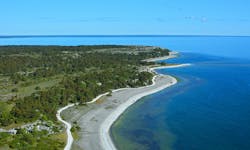Blackouts on Sweden's Biggest Island Stoke Fear as Reactors Shut
(Bloomberg) -- Ola Thuresson recalls the eerie quiet that unfolded at the limestone quarry he runs on an island in the Baltic Sea when machines that crush rocks suddenly lost electricity.
“When the power goes out, everything stops,” said the head of Nordkalk Oyj in Storungs on the northern tip of Gotland. “Production halts, equipment breaks, and we can’t even use our IT system.”
He should be getting used to it. There have been 10 major outages on the Swedish island since works began two months ago on the only cable to mainland, and factories and businesses across the nation are beginning to take notice. Power shortages may multiply this winter after some of the nation's oldest nuclear plants were closed for good, the grid manager Svenska Kraftnat has warned.
Blackouts have impacted everyone from the island’s almost 60,000 inhabitants to a whiskey maker and local grocery stores. The sudden cuts began in July when state-owned utility Vattenfall AB started a 350 million kronor ($28 million) project to replace a control station on the aging link.
“We knew it was a high risk project, but we had not expected so many blackouts,” said Mikael Bjorner, a spokesman for Vattenfall’s grid unit. “It was necessary to do this now to ensure security of supply to the island as the old stations were worn out.”
On Thursday afternoon Gotland yet again suffered a island-wide power outage, according to statement on the local grid company GEAB's website. As of 1:20 p.m., the company could not say when power was expected to return.
While the network manager had flagged for disturbances, the outages still raise concern about the ability of grid mangers to handle future shortages in the rest of Sweden.
“It is a foretaste of what will happen if security of supply is not safeguarded,” said Maria Suner Fleming, head of energy and environment issues at the Confederation of Swedish Enterprise. “It is extra worrying as we are approaching a time of worsening power balance during coming winters.”
It’s a change from previous years of surplus electricity. But after one of the Nordic region’s driest and warmest summers ever, hydro reservoirs are at their lowest level since 2006, and the price of futures contracts have soared to records. The risk of shortages rises as winter approaches and brings with it higher demand for heating, increasing the chances that price spikes during critical hours in the morning and late afternoon, according to the grid.
The network manager is expecting to make up the shortage by drawing more imports from neighboring countries. But that could be costly as cold snaps often spread beyond Sweden to affect the entire region.
Two years ago, the government reached a long-term agreement on energy with three opposition parties on energy policy, calling for Sweden to scale back nuclear power and expand renewables. Utilities are still working to lengthen the life of their six newest reactors. Two have been shut, and two more will close by 2020.
Those moves are causing concerns that Sweden may end up short of electricity as the nuclear plants tumble off the grid. The policies are “madness,” leaving the grid less stable, said Eric Anderzon, the chairman of Bergo Flooring AB, whose customers range from the iconic Cafe Opera night club in Stockholm to tennis centers. The closures are not even improving the environment, said Anderzon, who also heads a local industrial lobby group called Svenska Elnatsupproret.
“We are already starting to notice the unstable supply of power through higher prices, and it’s getting worse,” he said. Replacing a few nuclear reactors with thousands of small renewable units is also straining the grid and there’s a need for more investments here too, Anderzon said.
Back at Gotland, people are finding ways around the outages to still get their essential repairs.
“There is not a store that can work without electricity today,” said Anders Stumle, chief executive officer of Gotland Whiskey AB, which uses old oak casks from the legendary Laphroaig distillery in Scotland to produce the tipple. “We even had to start our small reserve generator to make coffee in the morning.”
